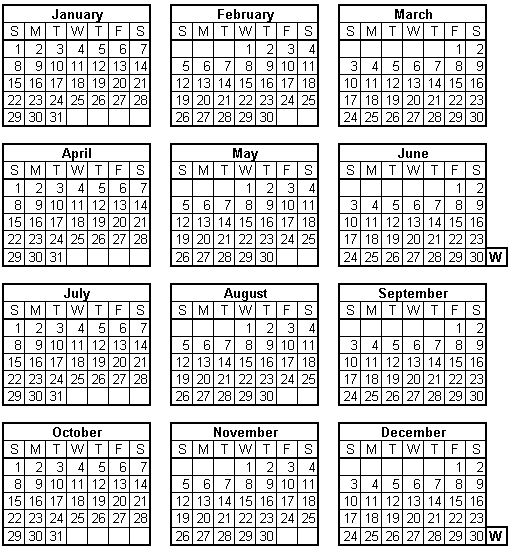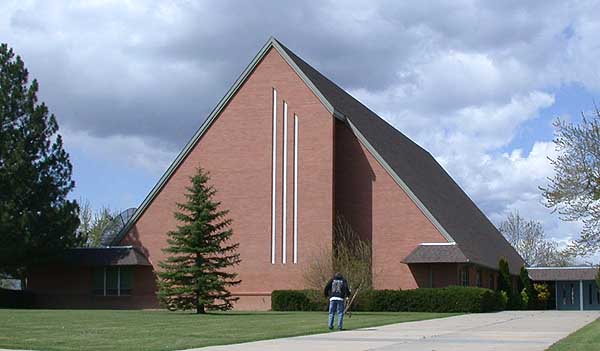|
Invariable Calendar
In April 1900, Professor L. A. Grosclaude of Geneva proposed the Invariable Calendar, New Era Calendar, or Normal Calendar with 12 months and four 91-day quarters of exactly 13 weeks. An additional day, termed New Year's Day, that was not any day of the week and not part of any month, would occur between December 31 and January 1. Another such day is inserted between June 31 and July 1 on leap years. This model would be a perennial calendar, with each date occurring perennially on the same day of the week. Grosclaude lists many business advantages to this. Three monthly days important to businesses, the 1st, 15th, and 30th would always occur on the same 3 days of the week, respectively, and additionally would never occur on a Sunday, for example. It became the model for The World Calendar, promoted by Elisabeth Acheils anThe World Calendar Associationsince 1930. Proposed Calendar {, class="wikitable" , - ! !! 1 !! 2 !! 3 !! 4 !! 5 !! 6 !! 7 !! 8 !! 9 !! 10 !! 11 !! 12 !! 13 !! ... [...More Info...] [...Related Items...] OR: [Wikipedia] [Google] [Baidu] |
Perennial Calendar
A perennial calendar is a calendar that applies to any year, keeping the same dates, weekdays and other features. Perennial calendar systems differ from most widely used calendars which are annual calendars. Annual calendars include features particular to the year represented, and expire at the year's end. A perennial calendar differs also from a perpetual calendar, which is a tool or reference to compute the weekdays of dates for any given year, or for representing a wide range of annual calendars. For example, most representations of the Gregorian calendar year include weekdays and are therefore annual calendars, because the weekdays of its dates vary from year to year. For this reason, proposals to perennialize the Gregorian calendar typically introduce one or another scheme for fixing its dates on the same weekdays every year. History and background The term ''perennial calendar'' appeared as early as 1824, in the title of Thomas Ignatius Maria Forster's ''Perennial calendar ... [...More Info...] [...Related Items...] OR: [Wikipedia] [Google] [Baidu] |
The World Calendar
The World Calendar is a proposed Calendar reform, reform of the Gregorian calendar created by Elisabeth Achelis of Brooklyn, New York in 1930. Features The World Calendar is a 12-month, perennial calendar with equal quarters. Each quarter begins on a Sunday and ends on a Saturday. The quarters are equal: each has exactly 91 days, 13 weeks, or 3 months. The three months in each quarter have 31, 30, and 30 days respectively. Each quarter begins with the 31-day months of January, April, July, or October. The World Calendar also has the following two additional days to maintain the same new year days as the Gregorian calendar. ; Worldsday : The last day of the year following Saturday 30 December. This additional day is dated "W" and named Worldsday, a year-end world holiday. It is followed by Sunday, 1 January in the new year. ; Leapyear Day : This day is similarly added at the end of the second quarter in leap years. It is also dated "W" and named Leapyear Day. It is followed by ... [...More Info...] [...Related Items...] OR: [Wikipedia] [Google] [Baidu] |
Sabbath In Seventh-day Churches
The seventh-day Sabbath, observed from Friday evening to Saturday evening, is an important part of the beliefs and practices of seventh-day churches. These churches emphasize biblical references such as the ancient Hebrew practice of beginning a day at sundown, and the Genesis creation narrative wherein an "evening and morning" established a day, predating the giving of the Ten Commandments (thus the command to "remember" the sabbath). They hold that the Old and New Testament show no variation in the doctrine of the Sabbath on the seventh day. Saturday, or the seventh day in the weekly cycle, is the only day in all of scripture designated using the term Sabbath. The seventh day of the week is recognized as Sabbath in many languages, calendars, and doctrines, including those of Catholic, Lutheran, and Orthodox churches. It is still observed in modern Judaism in relation to Mosaic Law. In addition, the Orthodox Tewahedo Churches uphold Sabbatarianism, observing the Sabbath on Sa ... [...More Info...] [...Related Items...] OR: [Wikipedia] [Google] [Baidu] |
Reform Calendars
Reform ( lat, reformo) means the improvement or amendment of what is wrong, corrupt, unsatisfactory, etc. The use of the word in this way emerges in the late 18th century and is believed to originate from Christopher Wyvill's Association movement which identified “Parliamentary Reform” as its primary aim.Reform in English Public Life: the fortunes of a word. Joanna Innes 2003 Reform is generally regarded as antithetical to revolution. Developing countries may carry out a wide range of reforms to improve their living standards, often with support from international financial institutions and aid agencies. This can include reforms to macroeconomic policy, the civil service, and public financial management. In the United States, rotation in office or term limits would, by contrast, be more revolutionary, in altering basic political connections between incumbents and constituents. Re-form When used to describe something which is ''physically'' formed again, such as re-casting ( ... [...More Info...] [...Related Items...] OR: [Wikipedia] [Google] [Baidu] |
Specific Proposals
Specific may refer to: * Specificity (other) * Specific, a cure or therapy for a specific illness Law * Specific deterrence, focussed on an individual * Specific finding, intermediate verdict used by a jury in determining the final verdict * Specific jurisdiction over an out-of-state party, specific to cases that have a substantial connection to the party's in-state activity * Order of specific performance, court order to perform a specific act Economics, finance, and accounting * Asset specificity, the extent to which the investments made to support a particular transaction have a higher value to that transaction than they would have if they were redeployed for any other purpose * Specific identification (inventories), summing purchase costs of all inventory items * Specific rate duty, duty paid at a specific amount per unit * Specific risk, risk that affects a very small number of assets Psychology * Domain specificity, theory that many aspects of cognition are s ... [...More Info...] [...Related Items...] OR: [Wikipedia] [Google] [Baidu] |
Armelin's Calendar
Armelin's calendar was developed around 1887 by French astronomer , who developed a twelve-month calendar in which the year of 364 days was divided into four equal quarters of 91 days. Armelin's calendar proposal was discussed chiefly under the auspices of the Société astronomique de France in 1887 and recently in the French Academy of Sciences. Structure # The year is divided into four quarters of three months each, and the arrangements for the first quarter repeat in each of the other quarters. The first and second month of each quarter have thirty days, and the third month 31 days. This accounts for 91 days in each quarter, or 364 days in all. # The remaining day in ordinary years is "New Year's Day". It is given no other descriptive title. It does not belong to any week or any month. It begins the year. January 1 is the day following New Year's Day. # The 366th day of leap year is likewise an extra day, bearing an appropriate descriptive name, perhap ... [...More Info...] [...Related Items...] OR: [Wikipedia] [Google] [Baidu] |
Alexander Philip
Alexander Philip (22 May 185821 January 1932) was a Scottish solicitor and campaigner for calendar reform. He was elected a Fellow of the Royal Society of Edinburgh in 1913 Life He was born in Portobello, Edinburgh on 22 May 1858, the son of Reverend Alexander Philip, minister of Cruden, one of four brothers all of whom were ministers who left the established Church of Scotland to join the Free Church at the Disruption. Rev. Alexander Philip latterly held charge of the Free Church at Dunfermline and Portobello. Alexander Philip was educated at George Watson's College in Edinburgh and then studied Law at the University of Edinburgh where he graduated MA and LLB. He began his legal apprenticeship at Webster, Will & Ritchie at 37 Queen Street in Edinburgh, where the junior partner was a son of Charles Will, Provost of Brechin. Following the death of Charles Will, Alexander Philip then became an assistant at C & J Will in Brechin, entering into a partnership w ... [...More Info...] [...Related Items...] OR: [Wikipedia] [Google] [Baidu] |

